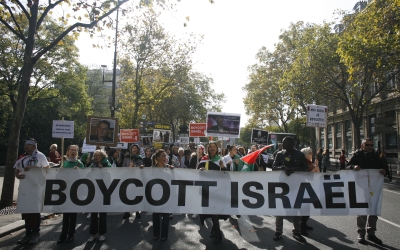UK minister criticised for demanding universities adopt IHRA antisemitism definition

A group of lawyers and retired judges have written an open letter condemning the UK education secretary for "forcefully" imposing a controversial definition of antisemitism on British universities.
Secretary Gavin Williamson told university vice-chancellors that if a majority of universities failed to adopt the International Holocaust Remembrance Alliance's (IHRA) antisemitism definition by December, then he would take action, alluding to the possibility of funding cuts.
The IHRA's definition includes problematic examples of antisemitism that have been criticised by human rights groups as well as some liberal Zionist organisations.
Some of the most controversial examples of antisemitism provided by the IHRA include banning anyone from "applying double standards" to Israel or requiring of Israel "behaviour not expected or demanded of any other democratic nation".
In a letter published in the Guardian on Thursday, the group of legal experts warned that Williamson's requirement of universities to adopt such a definition was "legally and morally wrong".
New MEE newsletter: Jerusalem Dispatch
Sign up to get the latest insights and analysis on Israel-Palestine, alongside Turkey Unpacked and other MEE newsletters
"The legally entrenched right to free expression is being undermined by an internally incoherent 'non-legally binding working definition' of antisemitism. Its promotion by public bodies is leading to the curtailment of debate," the eight legal authorities wrote.
The signatories of the letter include lawyers Bill Bowring, Frances Webber, Lord Hendy, Michael Mansfield, Hugh Tomlinson, Sir Geoffrey Bindman, and retired appellate judges Sir Anthony Hooper and Sir Stephen Sedley.
"The definition… has no legislative or other authority in international or domestic law," they continued, adding that noted scholars of antisemitism, including Professor David Feldman, director of the Pears Institute for the Study of Antisemitism at Birkbeck, "have criticised its shortcomings".
A spokesman for the department of education responded, saying that the British government "expects institutions to take a zero-tolerance approach to antisemitism, with robust measures in place to address issues when they arise".
Still, Kenneth Stern, one of the authors of the IHRA definition, wrote in 2019 that the IHRA definition "was never intended to be a campus hate speech code".
"Historically, antisemitism thrives best when leaders stoke the human capacity to define an 'us' and a 'them', and where the integrity of democratic institutions and norms (such as free speech) are under assault," he wrote in a column, also published by the Guardian.
Stern added that "on a college campus, where the purpose is to explore ideas, anti-Zionists have a right to free expression" and explained that the primary purpose of the definition was to aid in the collection of data related to antisemitism.
Use and criticism of IHRA definition
The definition, however, has grown to be so much more than what Stern seems to have ever intended. More than 30 countries have adopted the IHRA definition of antisemitism, including France, Germany, the United Kingdom, and recently the administration of President Donald Trump in the US.
The definition has been condemned by dozens of Jewish groups worldwide and by hundreds of leading Jewish and Israeli scholars.
In November, more than a hundred prominent Palestinians and Arab academics, journalists and intellectuals signed on to a letter that issued a warning to the international community over the increasing number of countries adopting the IHRA antisemitism definition.
The letter, published at the Institute for Palestine Studies, said the definition makes the false conflation of Judaism with Zionism and assumes that all Jews are Zionists.
"We profoundly disagree with this," the letter said. "The fight against antisemitism should not be turned into a stratagem to delegitimize the fight against the oppression of the Palestinians, the denial of their rights, and the continued occupation of their land."
Israel advocates have used the IHRA definition to target the Boycott, Sanctions and Divestment (BDS) movement, founded in 2005 by a coalition of Palestinian civil society groups.
The BDS movement calls for non-violent pressure on Israel through boycotts, divestment and sanctions until it ends the occupation of Palestinian territories, recognises Palestinian citizens of Israel with full equality, and promotes - as established in international law - the right of return for Palestinian refugees who were forced to flee from their homes.
The movement has seen increased popularity on college campuses during the past decade.
Middle East Eye delivers independent and unrivalled coverage and analysis of the Middle East, North Africa and beyond. To learn more about republishing this content and the associated fees, please fill out this form. More about MEE can be found here.






